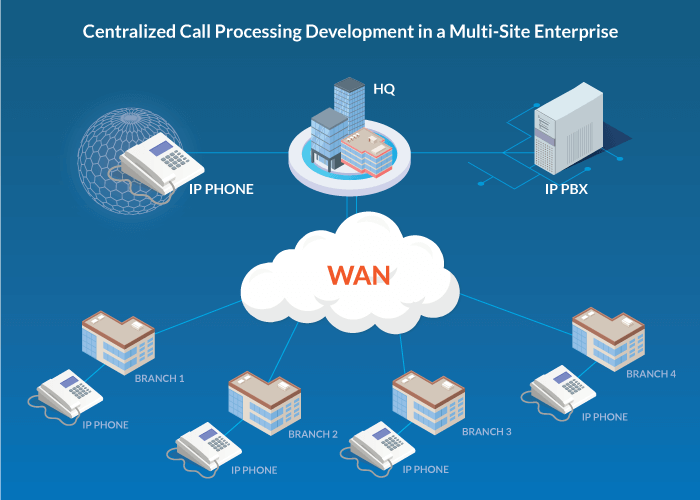With remote and hybrid work setups, your business needs to find effective and flexible call processing solutions. These types of solutions help teams answer calls without any issues, no matter where they are located. And you can manage key call features and functionality to enable voice continuity. How can you do this? You set up centralized call control.
Centralized Call Control for Distributed and Global Teams
Before we dive in, it’s important to understand that the terms call processing, call control, and call management are one and the same.
They all focus on managing your business’ inbound and outbound communication through one platform or hub.
In this post, we’ll run through the basics of centralized call processing. We’ll look at:
- What is Centralized Call Control?
- Different Types of Telephony Deployment Models
- Single vs Centralized vs Distributed Call Processing
What is Centralized Call Control?
Centralized call control is the process of managing business communication solutions for multiple distributed teams from one platform or location.
Call processing refers to how calls are managed within a business’ communication system. Calls are processed through either a centralized or distributed model and all telephony endpoints register to a central IP PBX network. With IP PBX systems — instead of traditional PBX systems with wires connecting to individual phones — you can manage call control virtually and cost-effectively.
And with VoIP, telephony endpoints (phones and devices) don’t have to be in the same physical location as your IP PBX. This way, all your systems need is network connectivity to the call processing agent.

What is centralized call processing for a multi-site telephony deployment?
A multi-site telephony deployment solution with call processing helps you manage calls for multiple locations through one central network. This enables your business to connect the main site and remote sites through IP telephony – all within one platform. When you set up a communication system this way, you spend less time and money on the administration and management of your business phone system.
Businesses typically choose this type of telephony deployment because it is cost-effective, offers centralized management, and is easy to set up.
Related: How Much Does an IP-PBX Cost?
Different Types of Telephony Deployment Models
Depending on your business size and communication needs, there are a few ways you can set up your system across different sites and locations. For instance, you may need to connect teams across regions through one centralized telephony solution. These teams will then share one network as well as crucial call features and functionality. In other cases, these locations may not need to depend on each other for call functionality and, instead, work independently.
It all comes down to what your business needs.
So, what are the different telephone deployment models?
1. Single-Site Model & Benefits
In a single-site model, call processing is managed and located at a single, self-contained site and a LAN (local area network). This call processing agent carries voice traffic throughout the site, powering different telephony devices. Calls beyond the LAN use the PSTN network to travel.
Benefits of single-site call control:
- Ease of deployment
- Suitable for small or mid-sized businesses
- Can be integrated with PBX systems
- Common infrastructure for a converged solution
- Significant cost benefits
- No dependency in case of IP WAN failure or insufficient bandwidth
- IP telephony codecs like G.711 are used for all IP phone calls
2. Multi-Site Centralized Call Processing Model & Benefits
This type of centralized call control includes a single call processing agent which transmits voice traffic through an IP WAN for multiple sites. The IP WAN does this by carrying call signaling between the central and remote sites to establish connections within these endpoints. Based on your communication setup, you may send voice traffic between H.323 endpoints or an endpoint and a gatekeeper. In this telephony deployment method, remote sites depend on the centralized call processing agent for call management and control.
Benefits of multi-site centralized call processing:
- Suitable for businesses with a main site and many smaller remote sites
- Connect distributed and global teams
- Access to call processing and contact center capabilities
- Centralized call management (including applications like voicemail and IVR)
- Reduced costs of administration and maintenance
- Save on PSTN costs for intersite calls by using IP WAN
- Maximum utilization of available bandwidth (voice traffic and data traffic)
3. Multi-Site Distributed Call Processing Model & Benefits
This type of call processing includes multiple independent sites, with each site having its own call processing agent. This agent is connected to an IP WAN that transmits voice traffic between the distributed sites. And in this model, the IP WAN does not carry call control signaling between sites.
Benefits of multi-site distributed call processing:
- PSTN works as a backup in case IP-WAN fails
- No loss of functionality since there is a call processing agent at each site
- Best suited for enterprises with multiple sites in different regions
- Scalable to hundreds of sites
- Maximum utilization of bandwidth (voice traffic and data traffic)
- Ability to use multiple gatekeepers for network redundancy
Single vs Centralized Call Processing vs Distributed Call Processing: A Comparison
| Single Site Model | Multi-Site Centralized Call Processing Model | Multi-Site Distributed Call Processing Model | |
| How it Works | Isolated and self-contained | Connects remote, distributed, and global teams | Connects remote, distributed, and global teams |
| Business Suitability | Small or mid-sized businesses | Businesses with a main site and many smaller remote sites | Enterprises with multiple sites in different regions |
| Administration | Centralized | Centralized | Distributed |
| Dial Plan | Easy configuration and maintenance | Easy configuration and maintenance | Complex |
| Dependency | Not dependent on IP-WAN failure | Dependent on IP WAN | No dependency since each site is independent |
| Bandwidth Utilization | Lack of maximum utilization | Maximum utilization (voice traffic and data traffic) | Maximum utilization (voice traffic and data traffic) |
| Cost Savings | Significant | Significant | Significant |
| Scalability | Low scalability | Can add multiple sites, but difficult to scale | Add hundreds of sites |
| Reliability | Self-contained reliability | Single point-of-failure vulnerability | Self-contained reliability |
| Redundancy & Network Failures | Low redundant, self-dependent | Requires additional redundancy. Difficult to provide resiliency over network failures | High availability and network redundancy. Resilient over network failures |
Centralized Call Control for Distributed and Global Teams
There are many ways to support local, remote, and global teams through one centralized call processing solution. You can either set this up through on-premise or cloud telephony services. Global Call Forwarding offers a variety of centralized business solutions for companies with teams spread across multiple locations. You can use our service within your existing PBX setup or build a new phone system with our call management features.
To learn more, speak with our telecom experts or chat with us online!


